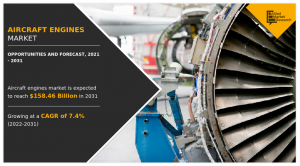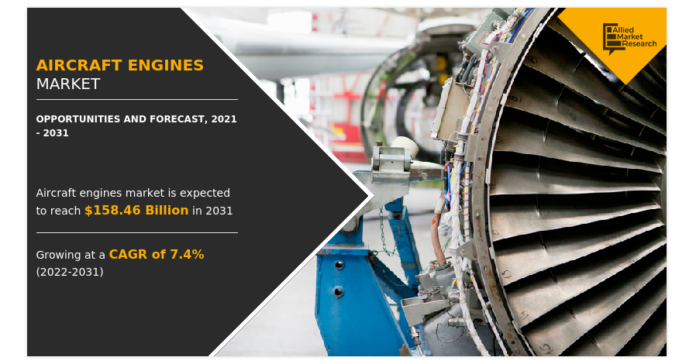
Aircraft Engines
Aircraft Engines Market to Grow $158.46 Billion by 2031- Allied Market Research
WILMINGTON, DELAWARE, UNITED STATES, September 27, 2023 /EINPresswire.com/ — Over the past few years, the aircraft engines market has emerged as a noticeably vibrant and robust sector that is an essential part of the aviation industry. Technological improvements have brought about the development of aircraft engines that are more productive, dynamic, and eco-friendly. From turbofan to turboprop, there’s an engine for every aircraft type, length, and purpose. Designed for optimum overall performance, dependability, and safety in commercial and military applications.
Nowadays, the growing awareness of sustainable aviation has led to a rise in the demand for environmentally safe and fuel-efficient engines. Because of this, manufacturers are setting apart massive resources for research and development to expand greener alternatives, such as hybrid-electric, hydrogen-powered, and different technologies that have the capacity to transform the aviation sector.
According to a novel report studied by Allied Market Research, the global aircraft engines market size is predicted to exhibit a remarkable CAGR during the forecast timeframe.
𝐏𝐫𝐨𝐜𝐮𝐫𝐞 𝐂𝐨𝐦𝐩𝐥𝐞𝐭𝐞 𝐑𝐞𝐬𝐞𝐚𝐫𝐜𝐡 𝐑𝐞𝐩𝐨𝐫𝐭- https://www.alliedmarketresearch.com/aircraft-engines-market/purchase-options
𝐑𝐨𝐥𝐥𝐬-𝐑𝐨𝐲𝐜𝐞 𝐭𝐞𝐬𝐭𝐬 𝐡𝐲𝐝𝐫𝐨𝐠𝐞𝐧-𝐩𝐨𝐰𝐞𝐫𝐞𝐝 𝐣𝐞𝐭 𝐞𝐧𝐠𝐢𝐧𝐞 𝐰𝐢𝐭𝐡 𝐄𝐚𝐬𝐲𝐉𝐞𝐭-
Rolls-Royce, a British manufacturer, and EasyJet, a British airline, have announced the world’s first commercial aircraft engine powered by hydrogen, likely setting a record for decarbonizing aircraft operations. The companies conducted a ground test of the engine at the United Kingdom Defense Ministry’s Boscombe Down aircraft test site, which involved the use of renewably produced green hydrogen, as well as a converted RAF AE 2100 regional aircraft engine.
The engine is classified as a concept demonstrator, indicating that the technology is still at an early stage of development. Nevertheless, Rolls-Royce has stated that they are determined to prove that hydrogen can provide a safe and effective zero-carbon fuel source for civil aviation. According to Chief Technology Officer, Grazia Vittadini, “The successful completion of the hydrogen test marks a significant step forward in the development of a hydrogen-powered vehicle.”
On the other hand, Johan Lundgren, the Senior Corporate Officer of EasyJet, said that the corporation is determined to retain to aid this pioneering research, as hydrogen has the capability to be a feasible option for a lot of aircraft. This would be a significant contribution to the goal of achieving net zero emissions by 2050.
It is worth noting that the test was claimed by the companies as a “World first” green hydrogen was used in the test which was powered by wind and tidal energy generated in Scotland’s Orkneys Islands. This renewable energy was then used to generate electricity, which was then used to separate hydrogen from water through a process known as electrolysis.
Moreover, EasyJet and Rolls-Royce together will now analyze the test results to enhance their knowledge of how to process and use hydrogen as an aviation fuel. The partners are also looking ahead to future tests, which will begin with additional ground trials before moving forward to test flights.
Rolls-Royce has announced the strategy to introduce a jet engine to its fleet, the Rolls-Royce Pearl 15, which is a more powerful version of its AE 2100-A jet engine, which is typically used in smaller turboprop aircraft. As part of the United Nations Race to Zero campaign, the airline and its parent business enterprise, Rolls-Royce, are committed to accomplishing net zero emissions with the aid of 2050 to reduce global warming to beneath the critical 1.5-degree Celsius threshold.
𝐑𝐞𝐪𝐮𝐞𝐬𝐭 𝐒𝐚𝐦𝐩𝐥𝐞 𝐏𝐚𝐠𝐞𝐬- https://www.alliedmarketresearch.com/request-sample/2461
One of the major concerns for airlines is finding an alternative to aviation fuel, which currently accounts for around 2.5% of CO2 emissions worldwide. One feasible solution is green hydrogen, which is crafted from renewable sources inclusive of green and water. In theory, planes would only emit water whilst powered by using green hydrogen. Hydrogen can be utilized in a whole lot of ways, consisting of a liquid in an engine instead of a gas, or as a fuel in a fuel cell instead of through combustion.
In addition, small hydrogen-powered airplanes have already been deployed, including those developed by aircraft manufacturer ZeroAvia, while large airlines such as Airbus are also exploring the potential of hydrogen. In 2020, the aerospace manufacturer unveiled three concepts for hydrogen-powered future aircraft.
Therefore, it is proven that the global aircraft engines market is becoming more and more innovative, and with a strong emphasis on sustainability as technology advances, we can look forward to even more innovations that will shape aviation in the future.
𝐌𝐚𝐤𝐞 𝐚𝐧 𝐈𝐧𝐪𝐮𝐢𝐫𝐲 𝐁𝐞𝐟𝐨𝐫𝐞 𝐁𝐮𝐲𝐢𝐧𝐠- https://www.alliedmarketresearch.com/purchase-enquiry/2461
David Correa
Allied Analytics LLP
+1 800-792-5285
email us here
Visit us on social media:
Facebook
Twitter
LinkedIn
![]()





![[Toyota Times] From Strengthening Foundations to Boosting Productivity – Toyota Focuses on Break-Even Volume [Toyota Times] From Strengthening Foundations to Boosting Productivity - Toyota Focuses on Break-Even Volume](https://businessfortnight.com/wp-content/uploads/2025/11/Toyota-Times-From-Strengthening-Foundations-to-Boosting-Productivity-Toyota-218x150.jpg)





























